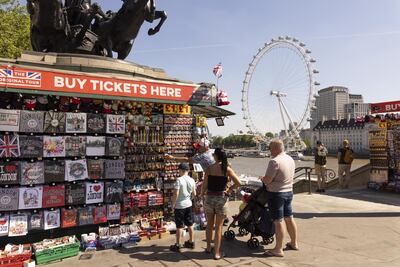The easing of lockdown restrictions in the UK has been delayed by four weeks, with the map to "normality" blocked by the need to ensure more people are vaccinated against the highly contagious Delta mutation of Covid-19.
UK Prime Minister Boris Johnson said the decision was to "save thousands of lives" with a quicker vaccination programme and applied to England.
Mr Johnson said the choice was to press on with lockdown easing or hit pause and give the National Health Service a chance to give more people vaccinations.
“As things stand, and on the evidence I can see right now, I’m confident that we will not need more than four weeks," he said.
"By being cautious now, we have the chance in the next four weeks to save many thousands of lives by vaccinating millions of people."
Ministers estimate up to 10 million people could be offered a second dose of a Covid-19 vaccine during the four-week delay.
The majority of those admitted to hospital with the Indian variant have only received one dose or none at all.
Sir Simon Stevens, chief executive of the NHS in England, said on Tuesday everyone over 18 would be offered a vaccine by the end of the week.
"It is now very important that we use the next four weeks to finish the job to the greatest extent possible for the Covid vaccination programme," he told the NHS Confederation conference.
Cabinet Office Minister Michael Gove said that despite the delay the government was “pretty confident” restrictions could be eased on July 19.
Of the accelerating vaccination campaign, he said it "should provide, we hope, a very high level of protection”.
Asked whether hundreds a day could die from Covid-19 once restrictions were eased, Mr Gove said the illness should be treated in the same way as the flu.
“We’re going to have to learn to live with Covid,” he said.
“It’s a very nasty virus but we can provide people with protection through the vaccination programme. As with flu, we know every year there are a number of people who contract it and every year, sadly there are a number of people who are hospitalised and suffer as a result.”
The most recent data has showed the Delta variant spreading through communities and putting more people into hospital.
During the pause, the country aims "to have double-jabbed two-thirds of the adult population", the prime minister said.
The UK has followed a phased road map to lifting coronavirus restrictions and the final milestone was to have been June 21.
On Monday, Mr Johnson said the latest data on the country’s coronavirus outbreak meant restrictions could not be lifted further.
Epidemiologists have been testing whether to allow lockdown easing against the effectiveness of the vaccination programme, taking into consideration hospital cases, deaths, infection rates and mutations of concern.
The Delta variant, first identified in India, has been sweeping through parts of the country.
Some data indicates it is responsible for nine in 10 cases in the UK. It also appears to be far more contagious than the original strain.
Last week included some of the worst days for new cases since lockdown easing began.
On Monday, the UK recorded another 7,742 new Covid-19 cases and three more deaths.
Some indoor hospitality has been open since May 17 but many businesses are still unable to make a profit because of continuing restrictions on numbers in their premises.
The delay will be a bitter pill to swallow for many hospitality businesses, which were pinning their hopes on the June 21 "Freedom Day".


